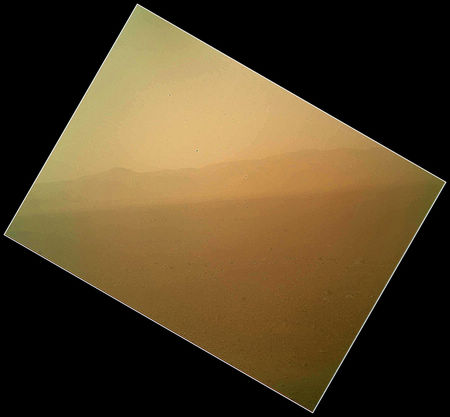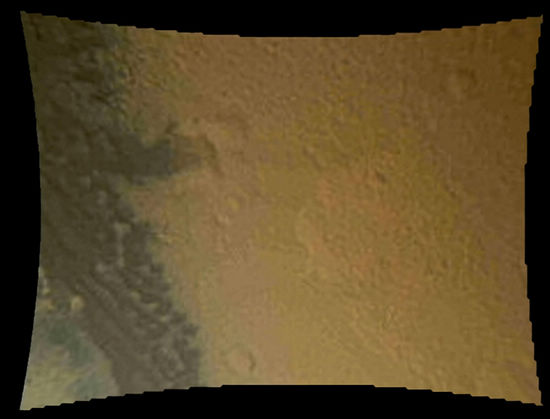Curiosity sends home first color photo
Updated: 2012-08-08 10:36
(Xinhua)
|
||||||||
 |
|
NASA-JPL has released the Curiosity rover's first color image of the Martian landscape in this image released August 7, 2012. [Photo/Agencies] |
LOS ANGELES - A vivid scene of sandy plain on the rim of Gale Crater was faithfully captured by the latest Mars rover Curiosity as NASA published the first of a batch of color pictures the vehicle beamed back on Tuesday.
The beaming of the picture, as well as a low-resolution video, suggests that the vehicle had a "very exciting ride to the surface, " NASA announced in a prepared statement.
"These images will help the mission scientists interpret the rover's surroundings, the rover drivers in planning for future drives across the surface, as well as assist engineers in their design of forthcoming landing systems for Mars or other worlds," NASA added.
 |
|
This color thumbnail image was obtained by NASA's Curiosity rover during its descent to the surface of Mars on August 5, 2012 and released by NASA on August 6, 2012. [Photo/Agencies] |
Earlier, NASA had released a black-and-white image captured by the spacecraft after it successfully touched down on the Red Planet early Monday. The pictures showed that the Mars Reconnaissance Orbiter was still encased in the descent capsule as it sailed under a parachute 210 miles (336 km) below.
Packed with 17 cameras to shoot high-quality photos and videos in black-and-white, color, and 3-D stereo, as well as 10 sophisticated science instruments on board, Curiosity is undoubtedly the embodiment of the great progress in multiple technologies used in the exploration of the Red Planet.
The mission aims to explore if Mars could be inhabitable for human beings and look for clues of planetary changes. By analyzing data sent back by it, NASA researchers can look into the composition of rocks and samples from the barren surface.
There will now be several weeks of systems checks before the six-wheeled, nuclear-powered rover begins to move across the Martian surface.
The car-size craft, weighing 900 kg, is five times heavier than its rover predecessors Spirit and Opportunity, both of which made their Mars landing in 2004.
The 2.5-billion-US-dollar Mars Science Laboratory, the formal name of the mission deploying the Curiosity rover, was launched from Cape Canaveral in Florida on November 26, 2011.

 Relief reaches isolated village
Relief reaches isolated village
 Rainfall poses new threats to quake-hit region
Rainfall poses new threats to quake-hit region
 Funerals begin for Boston bombing victims
Funerals begin for Boston bombing victims
 Quake takeaway from China's Air Force
Quake takeaway from China's Air Force
 Obama celebrates young inventors at science fair
Obama celebrates young inventors at science fair
 Earth Day marked around the world
Earth Day marked around the world
 Volunteer team helping students find sense of normalcy
Volunteer team helping students find sense of normalcy
 Ethnic groups quick to join rescue efforts
Ethnic groups quick to join rescue efforts
Most Viewed
Editor's Picks

|

|

|

|

|

|
Today's Top News
Health new priority for quake zone
Xi meets US top military officer
Japan's boats driven out of Diaoyu
China mulls online shopping legislation
Bird flu death toll rises to 22
Putin appoints new ambassador to China
Japanese ships blocked from Diaoyu Islands
Inspired by Guan, more Chinese pick up golf
US Weekly

|

|






